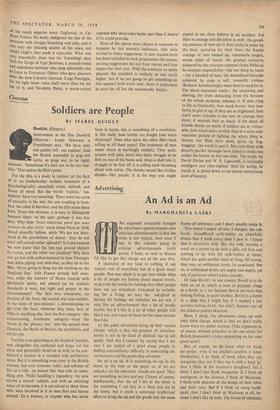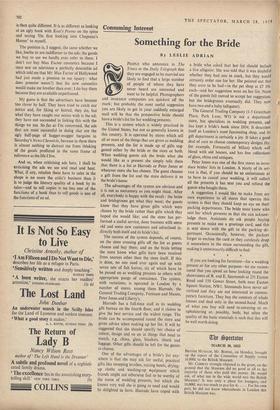Advertising
An Ad is an Ad
By MARGHANLTA LASKI AN argument invariably brought by advertisers against anyone who criticises advertisements is that the critic is not typical. And since I am, in this column, going to criticise advertisements (with praise, I hope, as well as blame) I'd like to get this charge out of the way first.
A journalist of my kind is nothing if not typical—not of everybody but of a great many people. Our one talent is to put into words what a lot of people are feeling about topical events, to provide the words for feelings that other people have not yet verbalised. Untypical in verbalis- ing for a living we may be : untypical in having the feelings we verbalise we are not. I may like an advertisement that a lot of people loathe; but if I like it, a lot of other people will like it too, and many of them for the same reasons that I do.
At this point advertisers bring up their second charge, which is that the purpose of advertise- ments is not to be liked or disliked but to sell goods. And this I counter by saying that I am sure I am typical of a great many people in finding extraordinary difficulty in associating ad- vertisements and the goods they advertise.
An ad is an ad. It is something we see in the street or the tube or the paper or, if we are unlucky, on the television. Goods are good. They are something we buy and use. I know, of course, intellectually, that the ad I see in the street is for something I can buy in a shop and use in the home, but it needs a conscious intellectual effort to bring the ad and the goods into the same frame of reference, and I don't usually make it.
This winter's nicest ad was, I thought, the red- faced, bemufflered milk-bottle, so cheerfully drawn that I smile every time I pass it. I know that it advertises milk. But this milk remains a word on a poster to do with a jolly red face and nothing to do with the milk-bottles at home, which are quite another kind of thing. Of course, they may, at subliminal levels, be associated. But so, at subliminal levels, are angles and angels, yet not, if you know what I mean, usefully.
Or take Bovril : in one context Bovril is to do with an ad in which a man in pyjamas clings to a bottle in a sea because Bovril prevents that sinking feeling; in quite another, Bovril is a bottle in a shop that I might buy if I wanted a hot savoury-tasting drink, but don't, because one of the children prefers Marmite.
Here, I think, the advertisers come up with their third charge, which is that we don't really know what we prefer anyway. (This argument is, of course, without prejudice to the one about the British housewife's choice depending on her own good sense.) But, of course, we do know what we think we prefer, even if we couldn't confirm it when blindfolded. I do think of Stork when they say margarine (but not if they say it with a hard `g'; then I think of the inventor's daughter); but. I think I don't like Stork margarine. If I think of toothpaste, in the abstract, I think of Macleans; I think with pleasure of the design of their tubes and their vans. But if I think of using tooth- paste, then I don't think of Macleans at all, be- cause I don't like its taste. The frame of reference is then quite different. It is as different as looking at an ugly book with Keat's Poems on the spine and saying 'On first looking into Chapman's Homer' to myself.
The position is, I suggest, the same whether we like, loathe or are indifferent to the ads; the goods we buy to use we hardly ever refer to them. I don't not buy Max Factor cosmetics because I once saw on television a perfectly detestable ad which told me that Mr. Max Factor of Hollywood had just made a promise to me (query : what does promise mean?) that his new cosmetics would make me lovelier than ever; I do buy them because they are available unperfumed.
My guess is that the advertisers have become too clever by half. They have tried to catch our notice and, for liking or hatred, they do, but what they have caught our notice with is the ad; they have not succeeded in linking this with the things we use. So far as I'm concerned, the ads that are most successful in doing that are the ugly half-page of hugger-mugger bargains in Saturday's News Chronicle, because in these there is almost nothing to distract me from thinking of the goods proffered in the same frame of reference as the life I live.
And so, when criticising ads here, I shall be criticising the ads we see and read and hear. What, if any, relation these have to sales in the shops is no more the critic's business than it is to judge the literary quality of a book by its sales—and to sell copies is no less one of the functions of a book than to sell goods is one of the functions of an ad.











































 Previous page
Previous page